Calm Before the Storm
All the news that's fit to bet on
As the end of the year draws nigh, prediction markets will spin up into a frenzy. Capital will be re-allocated towards markets that expire at the end of 2025, deadlines will approach, and all eyes will turn towards the November elections and the even more important TIME announcement.
But for now, Manifold is calm. Calm enough for its whales to be dumping nearly a million in trading volume on a flat line.
While the “Nothing Ever Happens” doctrine has faded by the wayside in light of a year of many things happening, sometimes we get periods of things not happening. Manifold creators have tried several times to operationalize whether “Something is Happening,” most notably by @Joshua as whether any of Manifold’s current top 20 markets would resolve against the obvious direction (an upset in an election, or a war breaking out, or something of that sort). But I’m a fan of the new approach creator @ItsMe has taken, relying on google trends quantification:
On Google Trends, pick “Worldwide” and “Web Search”. Pick a search term that you want to check for craziness. Pick “google” as the search term to compare to. Look at the end-of-day scores for “google” and [term]. The [term] : google ratio is the craziness score (C).
If on one of the days, C(term, day) > 0.5, and there exists a day in the previous 30 days such that C(term, day) / C(term, past_day) > 5, then this term is indeed CRAZY, and the market resolves YES.
Important exception: scheduled events which are fully expected to trend ahead of time do not count as crazy, even if they meet the craziness criteria. This includes things like:
Olympics
World Cup
Big movie releases
U.S. presidential elections
Some events in recent years which did meet the craziness criteria are:
COVID-19 pandemic
January 6 capitol riots
Russian invasion of Ukraine
Will Smith slapping Chris Rock
Death of Queen Elizabeth II
Biden dropping out of election
As you can see… nothing CRAZY has happened thus far in October:
Fortunately for us traders, the bar set by the rest of 2025 has been concerningly high, and there are still a few events to forecast.
Maine
For one, what was shaping up to be the most important Senate primary in 2026 just spun into chaos, as Graham Platner, the Sanders-endorsed oysterman, has endured several minor scandals culminating in the more major scandal of having a Nazi tattoo on his chest. Traders have not been kind to Platner’s chances. Before the news dropped, he was a favorite over the former governor hand-picked by Schumer and the democratic leadership to take on Susan Collins. His odds have since plummeted to 15%—even that seems high, it’s hard to imagine coming back from this.
Jordan Wood, the former chief of staff of Rep. Katie Porter (D-CA), has soared to 5%, not showing promise in consolidating the anti-Mills vote. Mills is by all accounts well-liked in Maine, but has promised to only stay one term in the Senate, by the end of which she would be 84 years old!
The importance of this race should not be overstated: Collins is the best pickup opportunity (traders think ~60%) for the democrats and on a per-voter basis, this will almost certainly be the race with the most dollars flowing in the 2026 midterms.
Manhattan
In a race that’s buzzy for a different reason, assemblymember Alex Bores is running for retiring congressman Jerry Nadler’s seat, the 12th congressional district of New York (most of Manhattan).
It’s a race that’s sure to garner attention and big names, but former software engineer Alex Bores might be the frontrunner at the moment in a large field, after being profiled in the NYT and dropping an ad highlighting his interest in policymaking on AI safety. A young, AI-savvy New Yorker member of Congress and SWE would probably be the toast of Manifold for a moment (someone get him an account).
At the southern tip of Bores’ district, NYU is one of four schools still deliberating on whether to defect in signing a compact committing to adopt the President’s policy agenda for higher education.
This represents a large shift from the bind that universities found themselves in earlier this year, with Columbia, a lesser-known university at the northern tip of Bores’ district, cutting a deal with the administration.
Washington, D.C.
The administration’s energy is likely more focused at the moment on the shutdown in Washington, which has now entered its fourth week. For a brief moment, the rumor mill on Republican senators breaking with leadership swirled, causing shorter timelines to spike, but we’ve settled back into a slow crawl towards longer time brackets, being duly created by @PaperBoy to satisfy the hunger of traders for record-breaking government shutdown lengths. The median forecast for when the shutdown will end is now roughly the Ides of November.
Paris
Perhaps due to all the Smithsonian Museums being shut down, some enterprising jewel thieves turned to the “Smithsonian of Paris,” the Louvre, for their latest heist. The French Crown Jewels were taken, and unfortunately may likely be disassembled, with the gold melted down and the jewels re-cut and sold individually abroad. This might be the worst thing to happen to the treasures of the Ancién Regime since the Holy Ampula was smashed in the Revolution.
Traders assign about a coin flip’s odds to whether any of the robbers will be apprehended by Christmas. For what it’s worth, former jewel thief Larry Lawton thinks these thieves were amateurs, so we might be lucky enough for some swift arrests, letting us celebrate a nice, warm holiday season, cozied up at the Louvre with Empress Marie Louise’s emerald necklace.
Hollywood
Oscars season is still far away, but it’s shaping up to be a tight race for highest-grossing film. Three sequels (of the Wicked, Zootopia, and Avatar franchies) are in the running against the current leader, A Minecraft Movie.
For what it’s worth, Sinners appears to be a lock for the most popular movie of the year on Letterboxd, although traders also think it might disappoint its fans at the Oscars in March.
San Francisco
While we continue to wait for the long-heralded Gemini 3.0 (traders appear to have been caught off guard by the delays),
…OpenAI has released a browser to play with,
…and xAI appears poised to release their Wikipedia alternative.
You can bet on props about the upcoming release, from whether it will have over 300k articles (55%) to whether it will say something negative about its creator (also 55%). You can also bet on whether Manifold users will think it’s an improvement on Wikipedia (29%?!).
Cyberspace
Creator @IsaacKing made a valiant, public attempt at vibecoding a working chess variant website. He gave himself a $200 budget with Claude Code, and relied entirely on Claude for bug-fixing without giving specific implementation instructions.
Ultimately, the market resolved NO, but to my untrained eyes, the website looks quite good. You can play the chess variant that Isaac and Claude created here: blackopschess.com.
I’m personally a huge fan of these types of complex, personal benchmarks, and I think they illustrate the strength of Manifold’s ability to crowdsource forecasts on AI capabilities. As PhD-level multiple-choice exams and coding competitions become Goodharted, it’s tough to fool a combination project-oriented outcome & market expectation. Right now, Claude Code scores a time-averaged 23% or so on the “vibecoding a chess variant to Isaac’s satisfaction” benchmark. I hope he tries again next year!
Happy Forecasting!
-Above the Fold


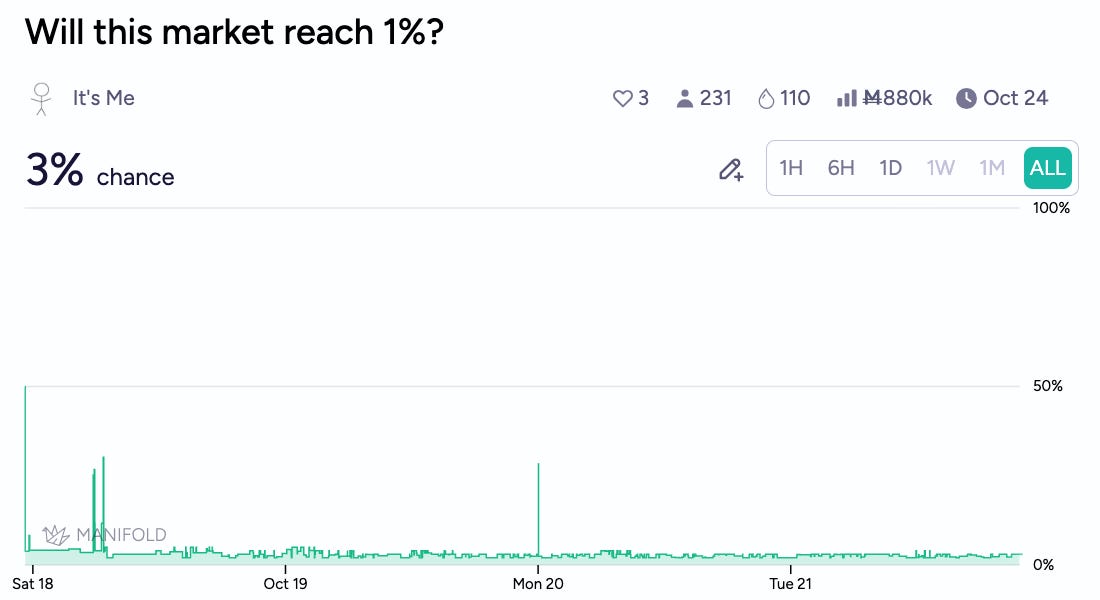
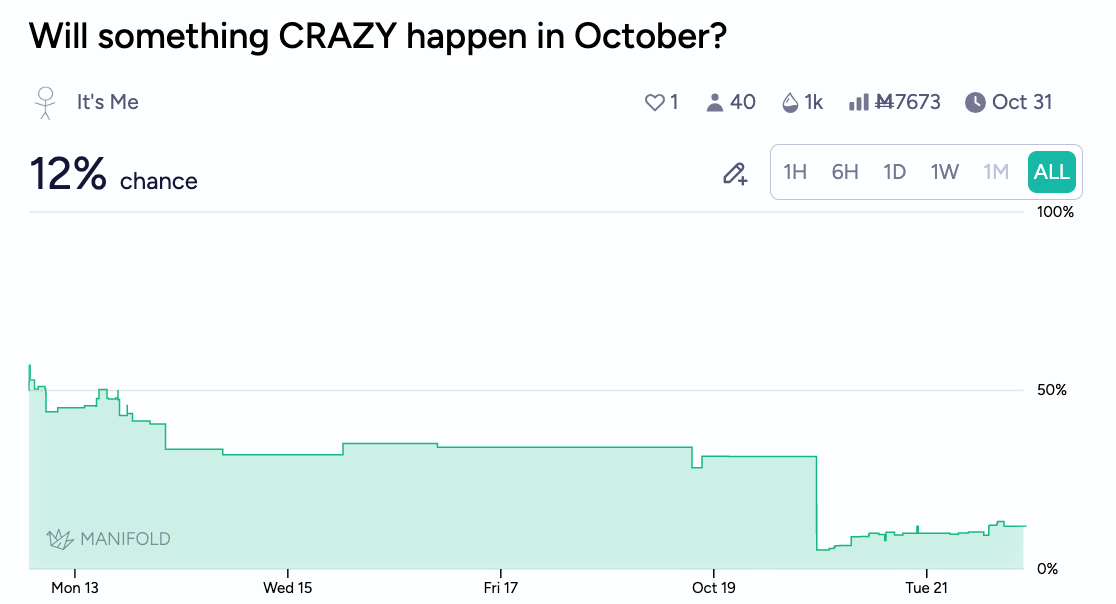
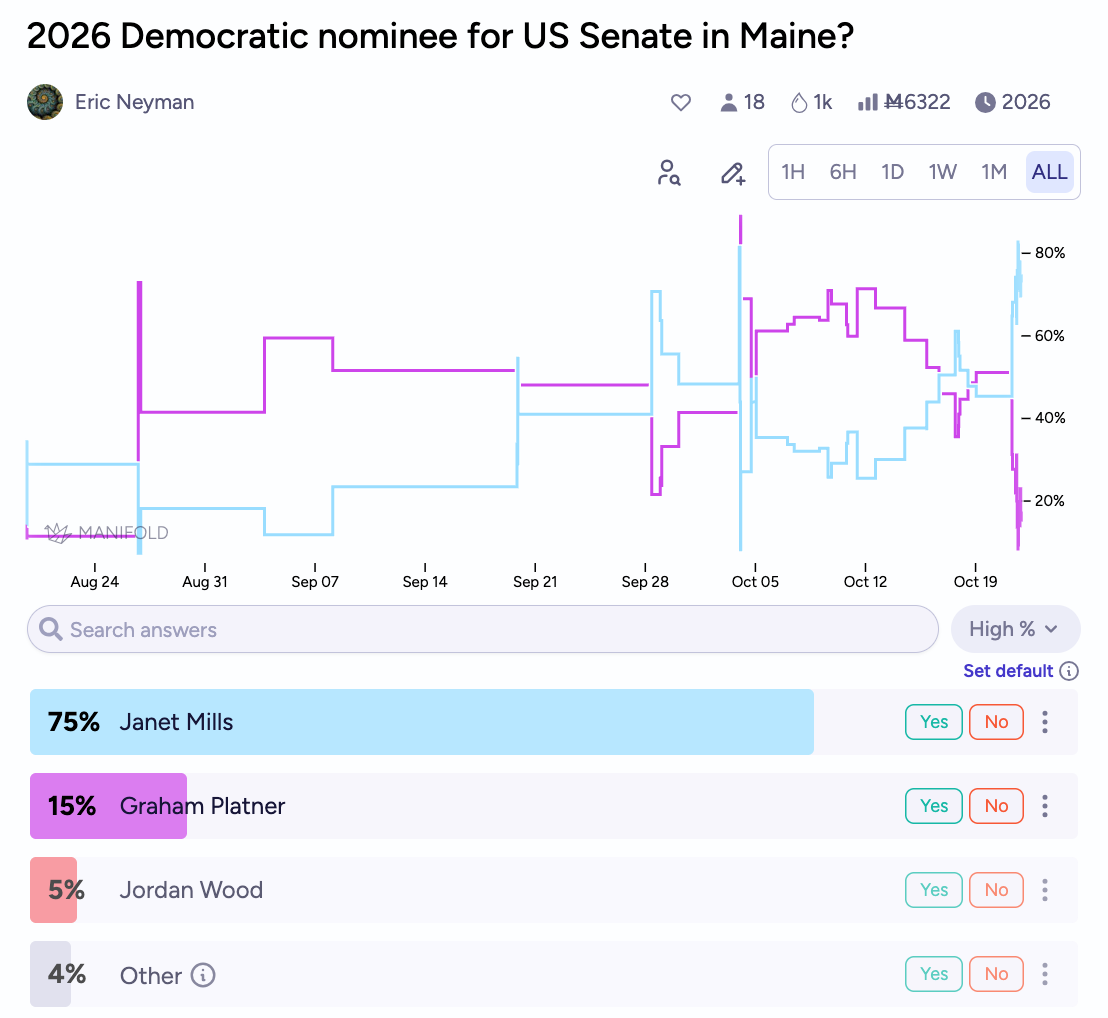

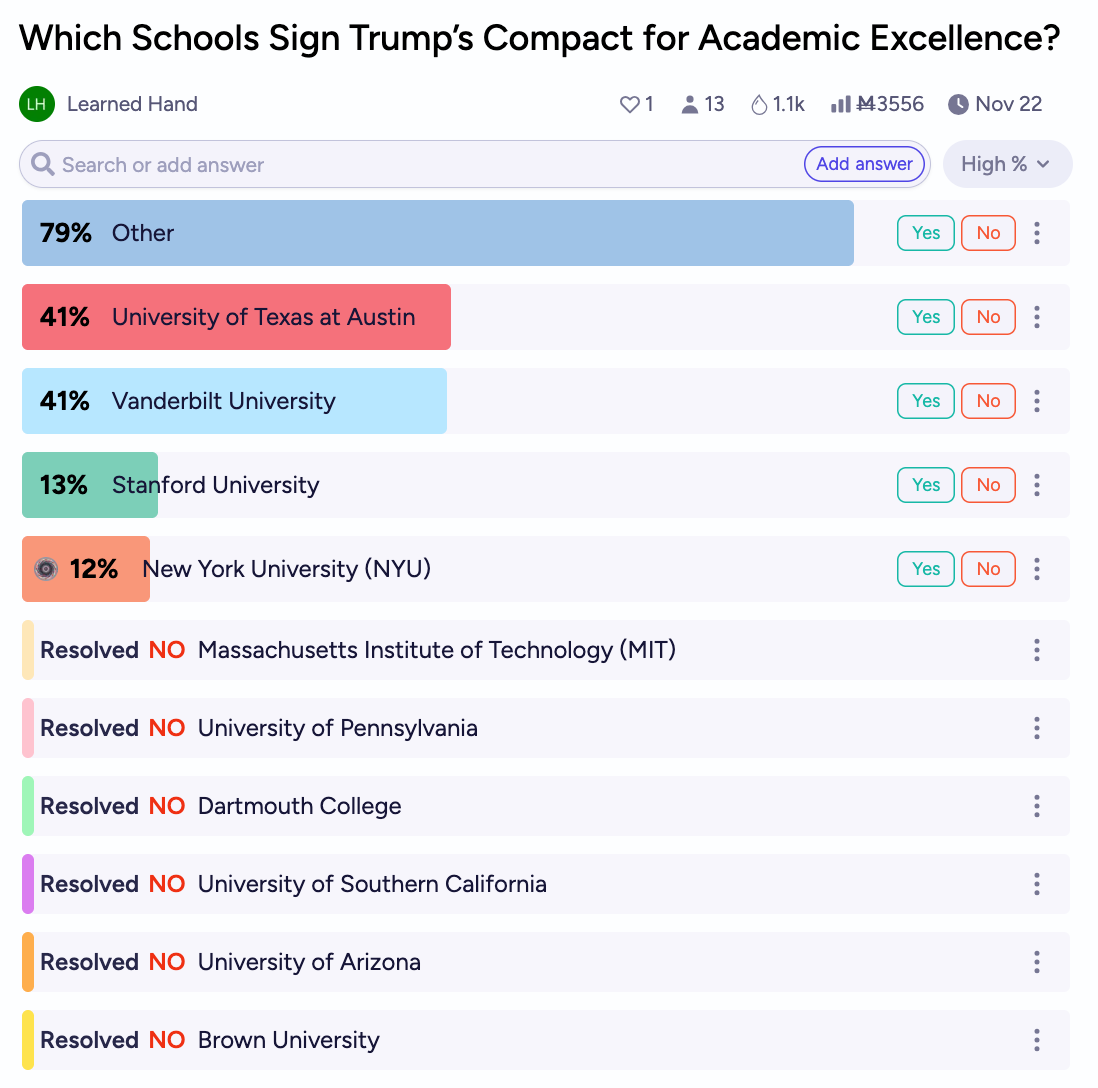




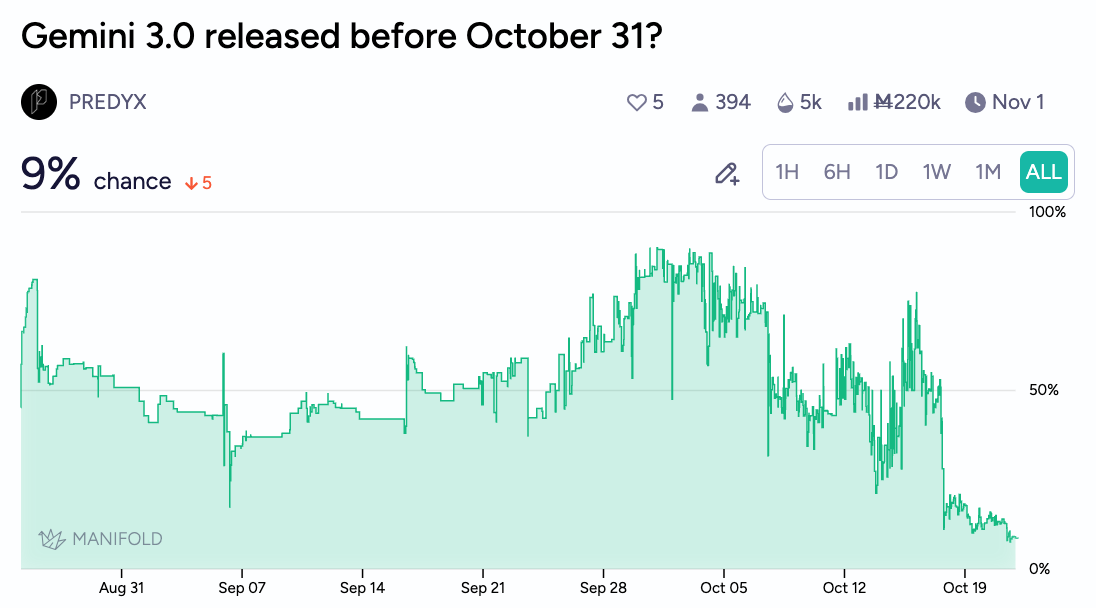
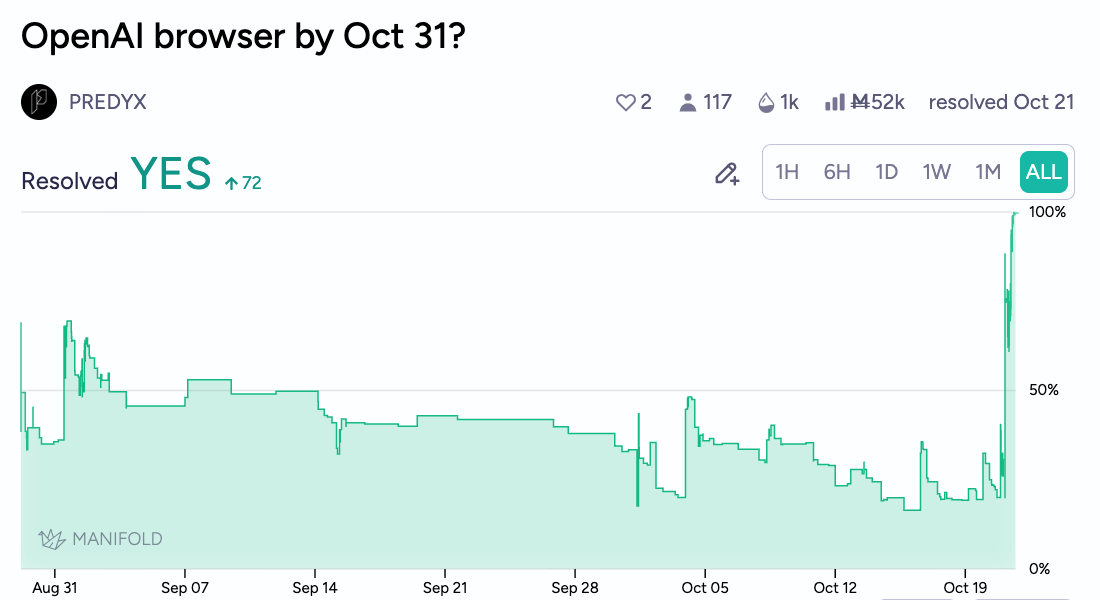


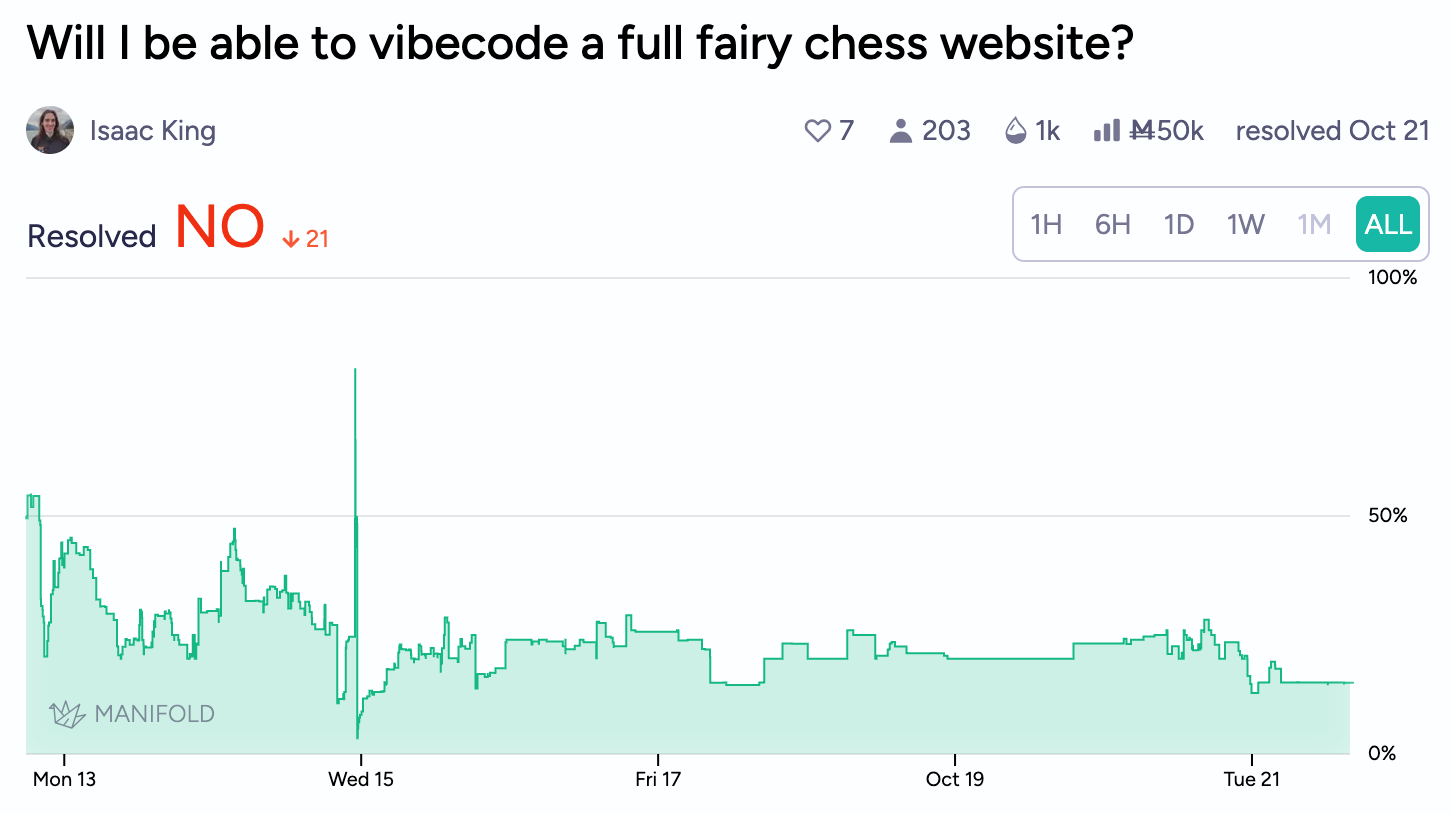
I was impressed by the market on this one. I think it was too high near the end, but for most of the duration ~20% seemed rational; they correctly predicted that I would have high standards.